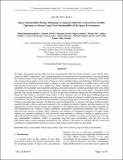Space sustainability rating: Designing a composite indicator to incentivise satellite operators to pursue long-term sustainability of the space environment
Author(s)
Rathnasabapathy, Minoo; Wood, Danielle; Letizia, F; Lemmens, S; Jah, M; Schiller, A; Christensen, C; Potter, S; Khlystov, N; Soshkin, M; Acuff, K; Lifson, Miles(Miles Thelonius Keylor); Steindl, Riley M.; ... Show more Show less
DownloadAccepted version (358.3Kb)
Open Access Policy
Open Access Policy
Creative Commons Attribution-Noncommercial-Share Alike
Terms of use
Metadata
Show full item recordAbstract
The Space Sustainability Rating (SSR) was first conceptualised within the World Economic Forum Global Future Council on Space Technologies, and is being designed by an international and transdisciplinary consortia including the World Economic Forum, Space Enabled Research Group at Massachusetts Institute of Technology (MIT) Media Lab, European Space Agency, University of Texas at Austin, and Bryce Space and Technology. With the increasing awareness of the rapidly growing number of objects in space, the implementation of a rating system, such as the SSR, provides an innovative way to address the orbital challenge by incentivising industry to design missions compatible with sustainable and responsible operations, and operate missions considering potential harm to the orbital environment and impact on other operators in addition to mission objectives and service quality. This paper builds upon the SSR concept introduced at the IAC in 2019, and provides in-depth description into the methodology used to design the SSR, based on successful rating systems in other industries such as LEED (green building energy and environmental design). This method seeks to provide a practice tool that governments, satellite operators and insurers can reference. The process also seeks to build capability among emerging space actors as they seek to understand how to design responsible space missions. The SSR is a composite indicator that is a function of the Space Traffic Footprint, measured through a mission index and compared to the so-called Environment Capacity and other measures of the responsibility shown by operator actions. The components of the SSR take into account mission aspects including on-orbit fragmentation risk, collision avoidance capabilities, detectability, identification, trackability, data sharing, on-orbit servicing, collision avoidance, debris mitigation, and adoption of international standards. The paper further explores key questions including; (i) what factors are most important to influence whether an operator seeks to reduce the potential for debris creation, (ii) how can the SSR can contribute to existing mechanisms (eg. UN Long-term Sustainability Guidelines, IADC) in supporting long-term space sustainability, and (iii) how can the SSR educate policy makers regarding manufacturers' and operators' motivations in choosing specific criteria and certifications in designing their mission to achieve a high rating or improve their existing rating.
Date issued
2020-01Department
Massachusetts Institute of Technology. Department of Aeronautics and AstronauticsJournal
Proceedings of the International Astronautical Congress
Publisher
International Astronautical Federation
Citation
Rathnasabapathy, Minoo et al. "Space sustainability rating: Designing a composite indicator to incentivise satellite operators to pursue long-term sustainability of the space environment." Proceedings of the International Astronautical Congress (January 2020): 60517.© 2020 Stefan A. Kaiser
Version: Author's final manuscript